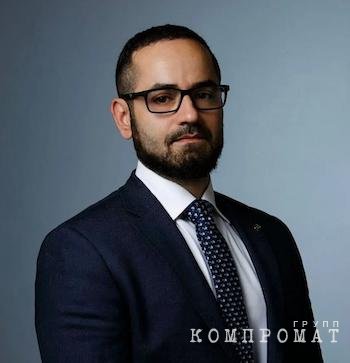Binance Africa Manager Escapes Arrest in Nigeria
The National Security Council (NSC) office confirmed on Monday that Nadeem Anjarwallaa suspect in a criminal investigation into Binance in Nigeria, has escaped custody.
 Nadeem Anjarwalla
Nadeem AnjarwallaHead of Strategic Communications at the Council Office Zachary Mijinyawa reported that Mr. Anjarwalla fled on Friday, March 22.
Our sources said Mr. Anjarwalla, 38, fled on Friday (March 23) from Abuja, where he and his colleague were staying guardedafter guards took him to a nearby mosque to pray during the ongoing Ramadan fast.
In a statement on Monday afternoon, Mr Mijinyawa confirmed Premium Times message.
He explained that upon receiving the report of the escape of Mr. Anjarwalla, the NSS office took immediate steps in collaboration with relevant security agencies, ministries and departments, as well as the international community to apprehend the suspect. Security agencies are working with Interpol to obtain an international arrest warrant for the suspect, he said.
“As a reminder, the Federal Government of Nigeria, like other governments around the world, is investigating money laundering and terrorist financing transactions occurring on the Binance currency exchange platform.”
Prior to his escape, Mr Anjarwalla, who holds British and Kenyan citizenship and is Binance’s country manager for Africa, appeared in a Nigerian court. The suspect escaped while under 14-day detention in a Nigerian court. He was due to appear in court again on April 4.
Binance reaction
Earlier on Monday, in an email exchange with Premium Times, the cryptocurrency platform said it had been informed that Mr Anjarwalla was no longer in custody in Nigeria. When asked about specific details of his location, Binance said it was only concerned about the safety of its employees.
Over the past three months, the Nigerian government has taken action against suspected money launderers and terrorist financiers, some of whom it claims are using the Binance platform for criminal activities.
The Nigerian government said more than $21.6 billion was sold by Nigerians whose identities were hidden by Binance.
The government also stated that the investigation revealed that Binance was used for money laundering, terrorist financing, currency speculation and market manipulation, which distorted the Nigerian economy and weakened the naira in relation to other currencies.
The detention of Binance officials in Nigeria comes months after the cryptocurrency platform pleaded guilty and agreed to pay $4.3 billion to settle money laundering charges brought by the US Department of Justice.
Founder and CEO of Binance Changpeng Zhao, also known as CZ, admitted his guilt and agreed to resign. The US court postponed the hearing of his criminal case until April 30.
On Monday, the Nigerian federal government also filed a criminal case against Binance.
Charges leveled against Binance include failure to pay value added tax (VAT), corporate income tax, failure to file tax returns, and complicity in aiding clients to evade taxes through its platform.
The government also claims that Binance failed to register with the Federal Inland Revenue Service (FIRS) for tax purposes and violated the country’s tax rules.
Chairman of the committee, Ginger Onwusibe, said he was committed to protecting Nigerians from financial crimes, especially by foreign companies. He called the charges against Binance “quite serious.”
The committee had previously sent a series of invitations to Tengu, but he had ignored them. In the event of another refusal, the department, according to Onwusibe, “will be forced to use its constitutional powers to take appropriate measures.” Binance has not officially commented on this statement.
Nigeria: Binance plays with the central bank
Two Binance executives have been arrested in Nigeria as the country cracks down on cryptocurrency exchanges. The Financial Times reports this.
According to the publication’s sources, company representatives flew to Nigeria after the authorities decided to ban several sites trading digital assets. However, upon arrival, they were detained by officials from the National Security Adviser’s office and their passports were confiscated.
The government has turned its attention to crypto platforms following the rapid devaluation of the Naira (NGN). In 2023, inflation in the country reached a thirty-year high of 29.9%.
The Nigerian authorities believed that trading services contributed to the deterioration of the local currency by creating their own unofficial NGN rate.
Adviser to the Nigerian President Bayo Onanuga confirmed that Binance is “blatantly” setting local exchange quotes for the naira and abusing the central bank’s role as exchange rate operator.
After the executives were detained, Binance stopped trading Bitcoin and USDT in pairs with NGN.
During the press conference, the Chairman of the Central Bank of Nigeria, Olayemi Cardoso, discussed the impact of the largest crypto exchange in terms of trading volume on the economy.
Previously, the exchange was required to provide a list of the top 100 users in Nigeria and the entire transaction history for the last six months. The platform was also required to settle any outstanding tax liabilities. Binance could potentially face a fine of $10 billion
The government has already ordered telecom companies to block access to some exchanges, including Binance, Coinbase and Kraken.
Last year, the Central Bank of Nigeria lifted the ban on transactions with cryptocurrencies and announced the need to regulate the market.
At the same time, restrictions on trading and storage of digital assets remain for banks in the country, effective from February 2021.
Let us recall that at the end of 2022, the media reported the plans of the Nigerian government to adopt a bill to legalize the use of Bitcoin and other digital assets.
The local Securities and Exchange Commission later announced its intention to allow asset-backed tokens. As a pilot project, the possibility of listing them on licensed platforms was envisaged.
Head of Binance Crypto Investigations Detained in Nigeria
 Tigran Ghambaryan
Tigran GhambaryanAs a US federal agent, Tigran Ghambaryan helped lead landmark investigations that caught cryptocurrency thieves and money launderers, dark web drug traffickers and child exploiters. Now, in his post-government role at the Binance cryptocurrency exchange, he himself has become the target of a very different kind of federal crypto-crime. He and another Binance executive were detained by Nigerian authorities. Since February 26, Gambarian, who now heads Binance’s criminal investigations team, and Nadeem Anjarwalla, Binance’s country manager for Africa based in Kenya, have had their passports confiscated and are being held at a government facility in Nigeria. capital Abuja. None of them have been charged, their family members said. According to the Financial Times, which first reported the detention of the two executives without naming them, they appear to be caught up in Nigeria’s sweeping move to ban cryptocurrency exchanges amid a sharp devaluation of the country’s currency.
“There is no definite answer: how is he doing, what will happen to him when he returns,” says Gambaryan’s wife Yuki Gambaryan. “And this uncertainty is killing.”
Gambarian, a US citizen, and Anjarwalla, a dual British-Kenyan citizen, arrived in Abuja on February 25, their families say, at the invitation of the Nigerian government to resolve an ongoing dispute with Binance. They met with Nigerian officials the next day, intending to talk to the government about its order to the country’s telecommunications companies to block access to Binance and other cryptocurrency exchanges, which regulators accuse of devaluing the country’s official currency, the naira, and allowing “illegal flows” of funds.
However, after Gambarian and Anjarwalla’s first meeting with the Nigerian government, Gambarian and Anjarwalla were taken to their hotels, told to pack their belongings and put up in a “guest house” that their families said was run by the Nigerian National Security Agency. They confiscated their passports and kept them in this house against their will.
According to relatives, Gambarian was visited by a representative of the US State Department, and Anjarwalla was visited by a representative of the British Foreign Office, but security from the Nigerian government was also present at these meetings, preventing them from speaking in private.
When WIRED contacted Binance, a company spokesperson declined to comment on what the men or the company itself are accused of, or what demands the Nigerian government might make for their release. “While it is not appropriate for us to comment on the nature of the claims at this time, we can say that we are working with the Nigerian authorities to return Nadim and Tigran home to their families safe and sound,” a Binance spokesperson told WIRED. “We will provide them with all possible support.” We believe that this issue will be resolved quickly.”
At some point last week, both men were transferred to a local hospital after Anjarwalla fell ill. His symptoms were unclear, but his wife said they may have indicated malaria. However, he has since recovered and both men were returned to the same house where they were held.
For Gambaryan in particular, becoming an obvious pawn in a dispute between Binance and an aggrieved government is an ironic twist. Gambaryan’s high-profile appointment as head of Binance’s investigations team in 2021 was widely seen as an attempt to cleanse the exchange of dirty money flows, better comply with regulations and work more closely with law enforcement. Late in November last year, Binance agreed to a deal with US prosecutors that would have seen it pay a record $4.3 billion for money laundering and face scrutiny from US regulators.
Prior to taking his position at Binance, Gambarian was well known in the law enforcement world for his track record of pioneering cryptocurrency cases as an agent with the Internal Revenue Service-Criminal Investigation (IRS-CI). For example, from 2014 to 2017, Gambaryan led the investigation into two corrupt federal agents who stole cryptocurrency from the shadowy marketplace Silk Road and sold secret law enforcement information to its creator, and worked to track 650,000 bitcoins stolen from the Mt. Gox, helped develop a cryptocurrency tracking method to find the server running the massive crime market AlphaBay, and had a hand in taking down the Welcome to Video cryptocurrency network containing child sex abuse material.
During his years with IRS-CI, Gambarian was a “first-class agent” with “the highest integrity,” according to Will Frentzen, a former prosecutor who worked closely with Gambarian. “The cases he was involved in are the list of the biggest cryptocurrency cases of the time,” says Frentzen. “He was innovative in prosecuting cases that few people in the country had thought of, and incredibly unselfish in terms of who gets rewarded.”
Gambaryan’s wife, Yuki, citing this record, argues that her husband has earned the support of the US government, which, she says, should now help negotiate his freedom. “He did so much good for this country during his career,” she says.
Anjarwalla, an Oxford- and Stanford-educated government relations specialist at Binance, joined the cryptocurrency company a year ago. His wife, Elahe Anjarwalla, wrote in a statement that he is a “mid-level Binance employee with no decision-making authority.” She adds that Anjarwalla, a Muslim, is in custody during Ramadan; that their baby son had gotten his first tooth in the past two weeks; and that their baby will reach his first birthday next week. “Nadeem is a loving husband and father. He is my best friend,” she says. “All I want is for Nadeem to be allowed to come home to us.”










